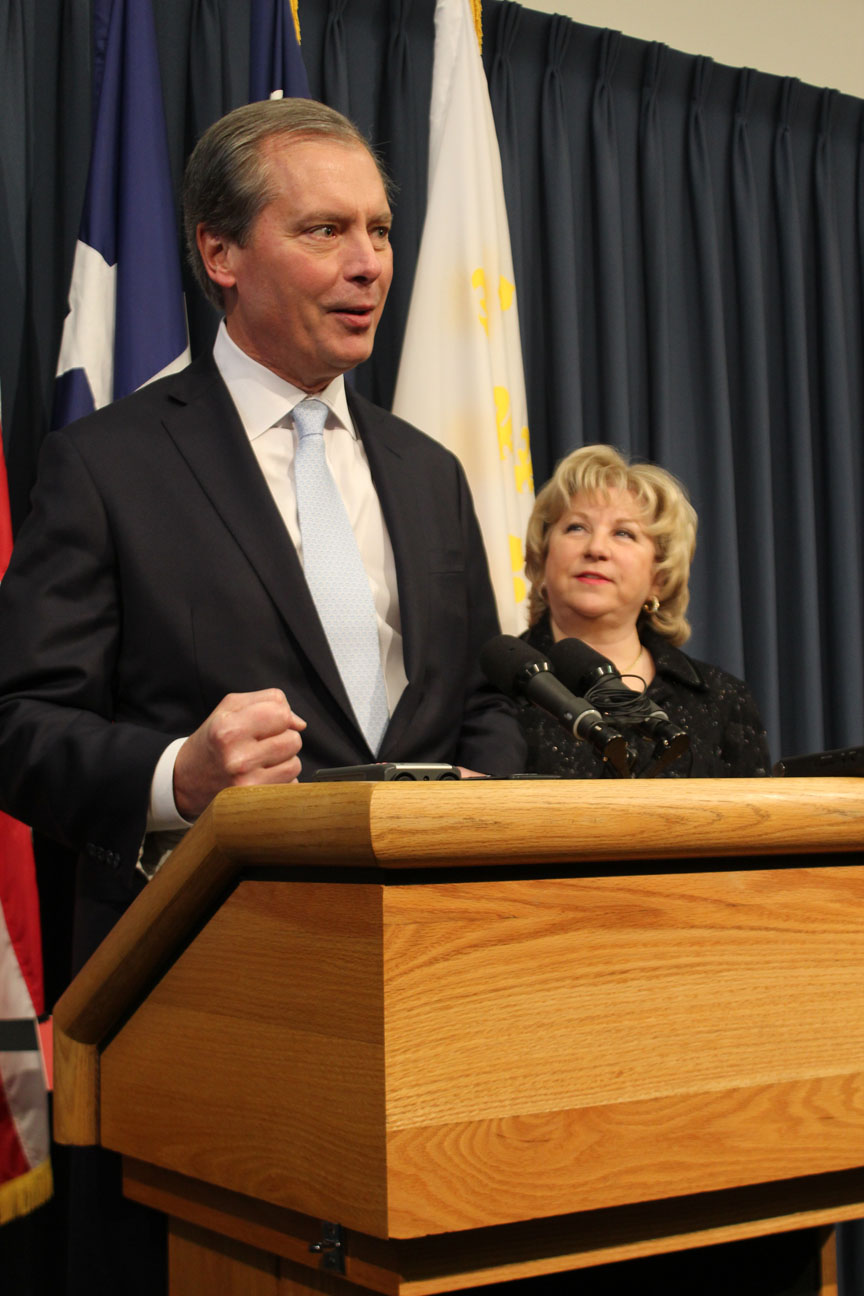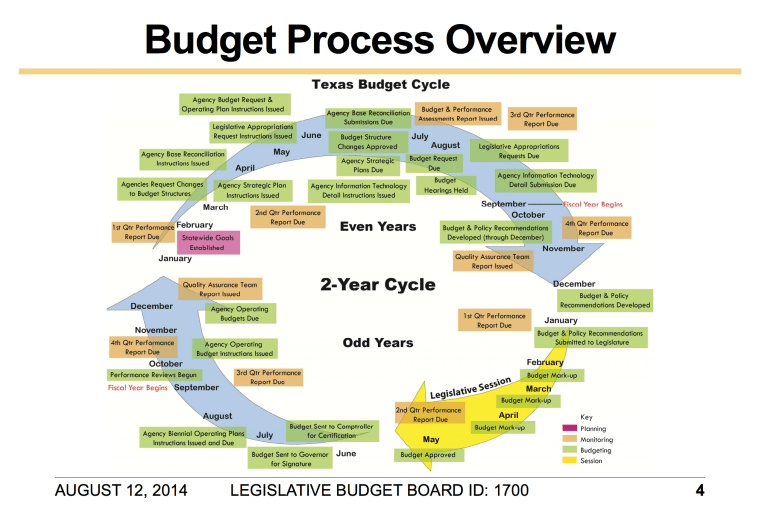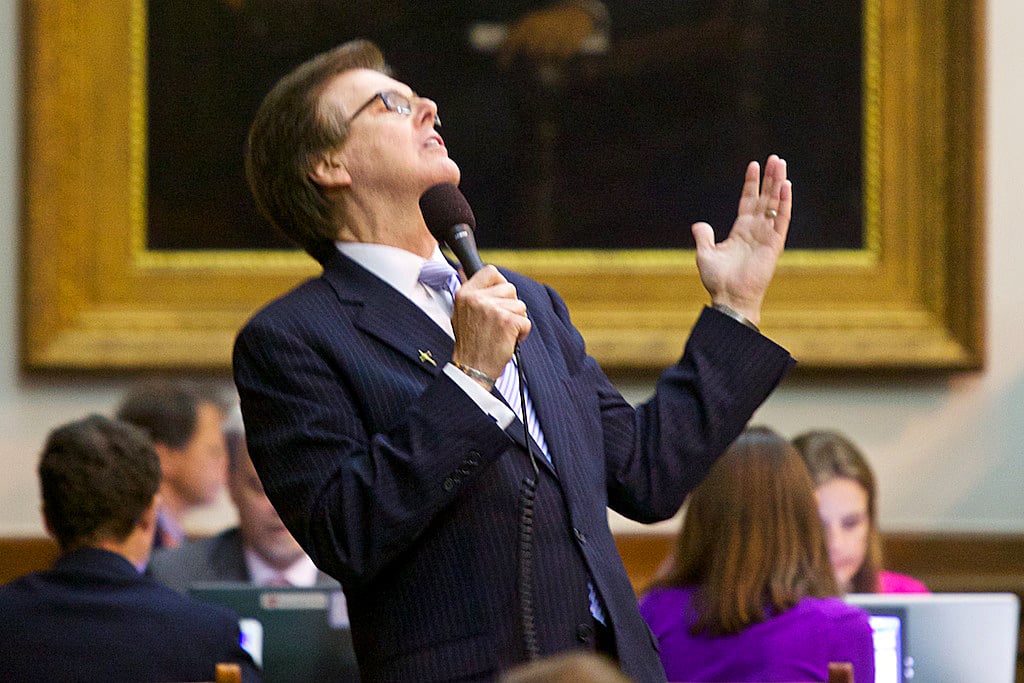
Jane Nelson Takes the Gavel
At Tuesday's meeting of the Senate Finance Committee, few policy details—but a preview of a potentially rocky road next session.

Above: Lt. Gov. Dewhurst and Sen. Jane Nelson (R-Flower Mound)
These days, we like our politicians to act and talk like us, and the Texas Senate is no exception. Long gone is the time that booze-soaked good ol’ boys hammered out legislation under the watchful eyes of Lt. Governor Bob Bullock. In recent years, the chamber’s relied to a large degree on independent dealmakers, figures like Tommy Williams and Robert Duncan, to take on the heavy legislative lifting. But that job has been getting tougher—Williams, the chair of the all-important Senate Finance Committee last session, had a hell of a time getting an important transportation funding package though the Lege, and he needed a special session to do it.
But Williams and Duncan will be gone next session, and the Senate appears to be otherwise lean on statespeople. There’s a decidedly populist mood in the air, which is a polite way of saying that there’s a few more cranks. New recruits like Don Huffines and Bob Hall, who beat dealmaker incumbents in the Republican primary, cast themselves not as small-r republicans but as champions for the voters—or rather, the minute number of people who voted in the GOP primary. And those are not people who are amenable to compromise.
Still, a budget must, by law, be drafted, and someone must take on the unenviable task of dragging it through the gauntlet. Enter state Sen. Jane Nelson, (R-Flower Mound), the new chair of the Senate Finance Committee. Outgoing Lt. Gov. David Dewhurst appointed her, but she’ll likely keep the post if Patrick takes over. She’ll be one of the Legislature’s most powerful people next session, and Tuesday afternoon provided her the opportunity for a coming-out party of sorts—the first meeting of her committee. She began it with a quick selfie.
Nelson’s rise to power—like the rise of Patrick and others—is more than a little remarkable given her origins. A socially conservative member of the State Board of Education at the beginning of the ’90s, she won a Senate seat in 1993. Her biggest legislative brawl that year was a fight over retaining the state’s ban on sodomy. It had already been ruled unconstitutional in Texas courts, and state Sen. John Whitmire (D-Houston) argued passionately for stripping it out of the state’s criminal code. Nelson fought it tooth and nail. She introduced an amendment to keep the ban on gay sex. “I’m not interested in having a politically correct penal code,” she said. She lost the fight over the amendment 16-12, but her side ultimately won that year. (The sodomy ban is still on the books in 2014.)
For the next decade, her name doesn’t pop up much in coverage of the Legislature. She supported a ban on human cloning, and wanted the state to divest from companies that produce violent or explicit music. But time served is king in the Senate, and she ultimately took on the mantle of senior stateswoman. As the long-serving chair of the Health and Human Services Committee, she’s been the Senate’s ringleader for health system overhauls, although she thinks the women’s healthcare system is doing just fine. Next session, her hands will be on everybody’s purse strings.
If you watched the hearing yesterday for clues about the Lege’s priorities next session, you wouldn’t have come away with much. Representatives from the comptroller’s office and the Legislative Budget Board came to give testimony about Texas’ fiscal circumstances. Dan Patrick, who could be running the Senate come January, frequently conferred with his deputy, state Sen. Donna Campbell (R-New Braunfels), but otherwise mostly kept mum. More than half of next year’s Senate class was in attendance, including Huffines and Hall, who sat in the audience to watch.
Next session’s budget battles are unlikely to look like those of the last few sessions. For one thing, the state will have a lot of money to play with next year. The economy is humming relatively smoothly. Oil revenues are skyrocketing. Which leads to a big question: Will the Legislature invest the surplus into roads, schools and services, or will it use the money to lower taxes or alter the way the state finances itself?
Here’s another question: How well are next year’s senators, with more freshmen and more ideological firebrands, prepared to do the dirty work of hammering out a budget? Here’s a slide the Legislative Budget Board prepared for senators on the shape of the budget process—information that will no doubt come in handy for the Senate’s new outsider-politicians:

To supplement the slideshow, the budget board prepared a thick compendium of information on the state budgeting and finance. Nelson, in her down-home, charming manner, loved it. She recommended it heartily to her fellow legislators. She took it on vacation with her, and read the whole thing. And it’s great bedtime reading, she added, because it puts you right to sleep. The 2015 session will probably not be so soporific.


